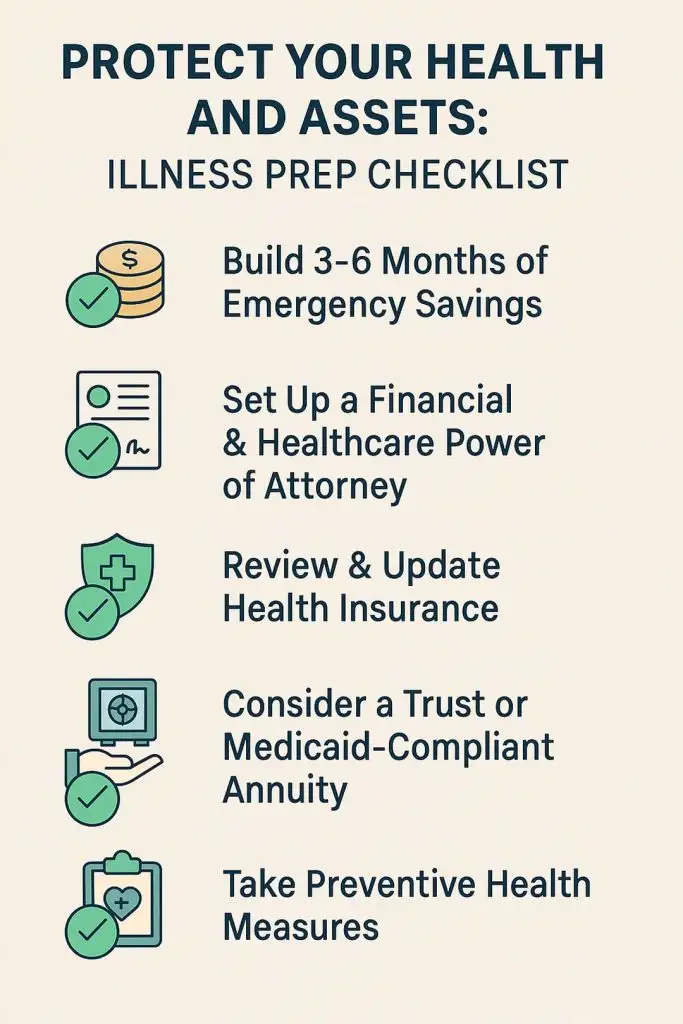A serious illness can hit anytime—are your finances ready? Learn how to protect your assets from illness and stay in control.

If you’re at risk of illness or just want to prepare, you need to protect your assets. You may have to download POA forms or even set up a trust. Here are the precautions you should take to keep yourself safe.
Protect Your Assets from Illness Before It’s Too Late
Illness doesn’t just affect your health—it impacts your finances too.
That’s why knowing how to protect your assets from illness is so important. From setting up a power of attorney to reviewing your health insurance, small steps now can save you later.
Preventive care, emergency savings, and legal tools like trusts can offer peace of mind. Whether you’re managing existing conditions or planning ahead, preparation is key.
Staying Prepared for the Worst
Even without any underlying health problems, a serious illness could strike at any time. For this reason alone, it’s worth building up your savings. You might need this to afford treatment or just in case you’re unable to work for some time.

Try to build an emergency fund of 3-6 months of expenses. Don’t worry if you need to start small here. Even small additions are sure to add up over time. Every cent you save will help you when you need it most.
It might even be worth drafting a will or updating your pre-existing one. This lays out any wishes you have for your assets in the event of your death. While this may seem daunting, it could give you the peace of mind you need.
Sorting Out Your Health Insurance
Make sure the health insurance plan you currently have is the right one. Even if this was true at the time you got it, things might be different today. Insurance plans are always shifting. Find one that offers you the best deal. It might even cover medications you have to take.
If your plan covers preventive care, take full advantage of this. Attend screenings and checkups as soon as possible. This could help you uncover illnesses before they get too serious. You can then get the treatment you need sooner. When it’s early enough, it will also likely cost less.

If you aren’t eligible for health insurance, Medicare and Medicaid are still options. If you’re 65 or older or have a specific illness, Medicare covers inpatient stays without a premium. Medicaid is mainly for low-income families and, in a lot of cases, comes with little to no costs.
The Importance of Your Power of Attorney
A power of attorney is especially helpful in the face of illness. Setting this up lets somebody that you trust make decisions on your behalf. These could be medical or financial. Either could have serious consequences, so always choose someone who can make the tough choices.
It might help to secure both POA types. A financial power of attorney, for example, helps to keep your assets safe until you’re better. Alternatively, healthcare POAs make sure you get treatment that fits you. For example, your “agent” will know if you consent to experimental treatment.

The Uniform Power of Attorney Act allows these documents to work across state lines. You can also tailor them so they only work for specific situations or only permit specific tasks. Ultimately, your POA makes sure your illness doesn’t stop you from communicating any wishes.
Depending on the state, you might need to notarize this document. Most major American banks offer full, free notarization services. This is much cheaper than hiring a notary.
Do Trusts Keep Your Assets Safe?
Many people turn to trusts to make sure they have full financial protection. This could even help them keep their assets away from debtors.
If you’re not eligible for Medicaid, an annuity may help. A Medicaid-compliant annuity effectively locks your assets away but slowly returns them to you. This helps you access free healthcare without possibly draining your entire life’s savings in the process.

You can also add your assets to a revocable living trust. You and your “trustee” can access this, or even change its rules, at any time. But if an illness incapacitates you, you may need a close family member to look after your finances.
It’s possible to mix a trust with your long-term savings goals. This lets you build the money you’ll require for your long-term care. You’ll then be able to slowly access it, but only as and when you need it.
The Need for Preventive Healthcare
If you take good care of yourself, this will really lower your chances of getting ill. This won’t keep you safe from everything. However, it’ll help your body resist high blood pressure or cholesterol, and possibly even cancer.

Similarly, you should again make use of any screenings/checkups your insurance offers. It helps to go beyond this, as well. Always keep an eye out for early warning signs of common diseases. This could help you enter early treatment.
Every illness starts somewhere. Fainting once or a persistent cough can mean a bigger problem is on the horizon. Never ignore serious symptoms, even if it turns out to be nothing.
Financial Protection Tips During Illness
If you get ill, you can make sure your assets are safe. POA forms also let you guarantee you get the best care possible. To ensure this, use online templates that cover your state’s power of attorney laws.
A sudden illness shouldn’t destroy your financial stability.
With tools like a POA, health insurance, emergency savings, and trusts, you can protect both your well-being and your wealth.
Act now to make smart decisions before you need them. Protecting your assets from illness is one of the most important steps toward long-term security.


Jessi is the creative mind behind The Coffee Mom, a popular blog that combines parenting advice, travel tips, and a love for all things Disney. As a trusted Disney influencer and passionate storyteller, Jessi’s authentic insights and relatable content resonate with readers worldwide.
